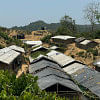Dhaka cautious in its optimism
Dhaka is cautiously examining Myanmar's proposal to take back Rohingyas and will keep its doors open for resolving the crisis through international means.
Myanmar's Union Minister for the Office of the State Counsellor U Kyaw Tint Swe, at a meeting in Dhaka on Monday, proposed taking back Rohingyas who crossed over into Bangladesh fleeing violence in Rakhine State.
The two countries also agreed to set up a Joint Working Group to prepare a detailed plan and coordinate the repatriation process.
The Myanmar side, however, yesterday declared that any repatriation would be on the basis of verification of the refugees according to the criteria agreed to by the two countries in a joint statement in 1992.
Senior officials at Bangladesh foreign ministry and former diplomats saw the outcome of Monday's talks as a positive development but said there is no reason to trust Myanmar as the country may have an intention to defuse the global outcry over the persecution of Rohingyas.
"The Myanmar's move is absolutely eyewash and they have taken this initiative amid international pressure and condemnation," said a high official of the government. "Bangladesh should not fall into the trap laid by Myanmar," he added.
"We have kept our doors open for resolving the Rohingya problems both through bilateral and international means," said a senior foreign ministry official.
A press statement of Myanmar State Counsellor's Office yesterday read, "The union minister expressed his firm conviction that issues arising between two neighbours can be resolved bilaterally, in an amicable manner, taking into consideration the national interests of both countries."
After the bilateral meeting in Dhaka on Monday, Foreign Minister AH Mahmood Ali told reporters that Rohingya population would be verified by the JWG, but without the UN involvement.
"Bangladesh has proposed a bilateral agreement [with Myanmar] to help implement the repatriation," Mahmood added.
But it remains unclear how could the verification be done.
The Rohingyas are denied citizenship under the controversial 1982 law.
When queried about identification papers, a number of refugees in Teknaf told The Daily Star earlier that they could not either bring any documents while fleeing for life or those were burned in the fires set by the security forces.
Some even pointed out that they had never even received any such documents despite applying for those on several occasions.
Several foreign affairs experts, including serving and former diplomats, categorically said that it would not be wise to go ahead with the repatriation process without the UN involvement.
They said the JWG could be formed at the bilateral level but the bilateral agreement should be done in the light of May 12, 1993 deal between Bangladesh and Myanmar which ensured involvement of UNHCR and UN bodies.
Former ambassador FA Shamim Ahmed said the Myanmar move is certainly intended to defuse the international momentum and to buy some time. "Since this is an evolving situation, so we have to wait and see the formation of JWG and its detailed plan on how to start the repatriation."
A senior official of the foreign ministry yesterday pointed to the statement, issued by the State Counsellor's Office, that referred to the MoU of April 28, 1992, which was fully bilateral and had no involvement of UN bodies.
On Kyaw Tint Swe's return to Naypyidaw from Dhaka, the State Counsellor's Office issued the press statement, also reading: "The union minister also reiterated the commitment made by Myanmar's State Counsellor Daw Aung San Suu Kyi on September 19, that Myanmar is ready to begin the verification and repatriation of refugees."
A foreign ministry official said Suu Kyi in her Sept 19 speech clearly mentioned about return of Rohingya refugees in line with the 1993 Rohingya Repatriation Agreement between Myanmar, Bangladesh and UNHCR.
But yesterday's press statement did not mention the 1993 deal, creating confusion and showing Myanmar's lack of sincerity, the official added.
The statement completely ignored any role of UN or its concerned organisations, which seriously worried Dhaka as it believes safety, security, stability and freedom of movement of Rohingyas is essential for their return.
ROHINGYAS SCEPTICAL
Rohingyas in Bangladesh were sceptical yesterday about their chances of ever going home to Myanmar, even though the government there has given an assurance it would accept people verified as refugees.
"Everything was burned, even people were burned," said a man who identified himself as Abdullah, dismissing the chances that people would have documents to prove a right to stay in Myanmar.
A government spokesman of Myanmar said under the 1993 pact, even a hospital record was enough to prove residency, but it was only Myanmar, not Bangladesh, that could verify citizenship.
"We have a policy for the repatriation process and we will go along with that," the spokesman, Zaw Htay, told Reuters.
But even if refugees have documents, many are wary about returning without an assurance of full citizenship, which they fear could leave them vulnerable to the persecution and curbs they have endured for years.
Amina, 60, laughed at the thought of returning.
"If we go there, we'll just have to come back here," she said. "If they give us our rights, we will go, but people did this before and they had to return."
Last month, Anwar Begum told Reuters she had fled from Myanmar three times. The first time was to escape a 1978 crackdown, and she returned the following year. She fled again in 1991 and returned in 1994.
"I don't want to go back," the 55-year-old added. "I don't believe the government. Every time the government agrees we can go back, then we're there and they break their promise."

 For all latest news, follow The Daily Star's Google News channel.
For all latest news, follow The Daily Star's Google News channel. 








Comments